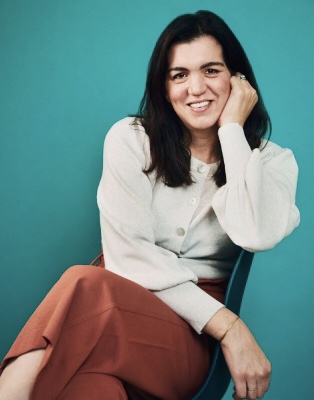BY ANGELA FAIRHURST
Lauren Gropper saw an opportunity to have a positive impact on both the environment and consumer habits in an industry that is dominated by expendable plastic. Gropper, an economic designer for Hollywood sets, was struck by the striking contrast between the sustainable practices she had in place behind the scenes and the mountains of foam waste that production breaks produced. This disconnect gave rise to a concept that would ultimately transform the expendable tableware market.
” My background is in economic design”, Gropper explains. When I had the chance to travel to Los Angeles to apply green design principles to film and television sets, I was working in the green building space in New York City. When I first noticed that despite making my best efforts to preserve the environment, the sets were filled with single-use plastic, I was trying to find one.
A PLASTIC WORLD: A GREEN VISION
Before Repurpose, eco-conscious consumers had limited options when it came to expendable tableware.
While there were other options for cleaning products and baby food that were organic, plastic manufacturers like Solo and Dixie dominated the tableware market. Gropper recognized a crucial gap in the market for environmentally-friendly biodegradable products
that could cater to active parents, party hosts, and anyone seeking practical, guilt-free alternatives to traditional cheap items.
” I knew there had to be a better way, but at the time, there were no responsible alternatives to single-use plastic tableware available at popular retailers”, Gropper recalls. ” So, I took matters into my own hands, and the idea of Repurpose was born”.
FROM HOLLYWOOD SETS TO SUSTAINABLE STARTUPS
In 2010, Gropper took a bold step, pivoting from her career in Hollywood to launch Repurpose, a brand dedicated to producing plant-based, biodegradable alternatives to regular biodegradable products. ” I launched Repurpose in 2010 in response to a problem, not a trend”, she states. We were the first company to sell biodegradable tableware in stores in the United States, introducing it anywhere.
PIONEERING A NEW CATEGORY
Repurpose’s launch was no easy task. Gropper faced significant difficulties in securing funding and establishing her brand in a market dominated by legacy players as a female founder in the CPG ( Consumer Packaged Goods ) industry almost 15 years ago. From convincing retailers to getting her products in stock to competing with well-known brands with big pockets, the journey was full of challenges.
Despite these challenges, Gropper’s persistence and unwavering belief in her products paid off. Repurpose became the first company to sell plant-based recyclable tableware in both the general public and on a global scale. Consumers began to notice the company’s creative approach and commitment to sustainability, slowly altering the landscape of the expendable goods market.
MATERIAL INNOVATION AND DESIGN
One of Repurpose’s essential innovations lies in its material composition. The company’s cups, which look remarkably like plastic, are basically made from plant-based materials. These include upcycled molded fiber, PLA ( a bioplastic derived from corn starch or sugarcane ), PHA, and PBAT. These materials are more socially conscious and function similarly to regular plastics.
Repurpose products are regarded as economically compostable, but they also need specific conditions that are typical in industrial composting facilities to effectively break down. This distinction highlights the ongoing issues facing the green products sector, where suitable disposal infrastructure is essential to achieving these innovations’ full environmental benefits.
SUCCESS THROUGH INNOVATION AND PERSISTENCE
Today, Repurpose stands as a testament to Gropper’s vision and determination. The business has established itself as the top brand in healthy and specialty tableware, and it owns one-third of the eco-compostable tableware category. Convert products can be found in over 12, 000 stores nationwide, including big retailers like Whole Foods, Albertson’s, Kroger, and Costco.

The foundation of Repurpose’s success is a commitment to quality and ongoing innovation. To produce products that are both sturdy and functional, the company uses clean ingredients like corn, recycled wood pulp, and sugar cane. Repurpose can now compete successfully with classic plastic goods while still upholding its eco-friendly ethos as a result of this approach.
EXPANDING THE ECO-FRIENDLY HORIZON
Gropper has expanded Repurpose’s product line to include a wide range of recyclable household goods, not content with revolutionizing the tableware industry. The company now offers bamboo toilet paper, paper towels, trash bags, and even recyclable cling wrap. This expansion reflects Gropper’s continued commitment to providing green alternatives to all facets of everyday life.
A MODEL FOR SUSTAINABLE BUSINESS
The journey of Repurpose’s Lauren Gropper serves as an inspiring illustration of how entrepreneurship can promote good climate change. Gropper has developed a brand that not only offers eco-friendly products but also educates consumers about the importance of responsible choices by identifying a pressing need in the market and using her expertise in green design.
” Actually since I was a teenager, I’ve been intrigued and excited about green solutions”, she shares. ” I earned my bachelor’s degree in geography and climate studies, then went on to earn a master’s in green design. Before starting Repurpose, I first worked in the natural building sector for many years.
As climate change concerns continue to grow, Repurpose’s mission becomes extremely important. The success of the business demonstrates that it is possible to create a successful business model based on sustainability without sacrificing either quality or convenience. With Repurpose, Lauren Gropper has not just established a profitable brand, but also opened the door to a more sustainable future for consumer goods.
Gropper concludes with a strong statement that sums up her mission:” I really believe that embracing sustainability does not mean sacrificing convenience.”



